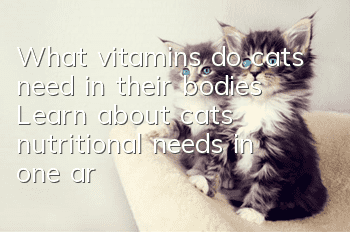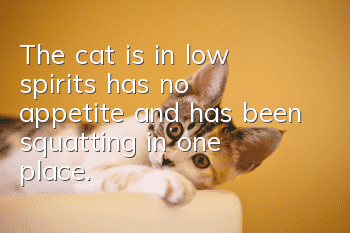What vitamins do cats need in their bodies? Learn about cats’ nutritional needs in one article!

What vitamins do cats need in their bodies? Understand the nutritional needs of cats in this article! Vitamins are a particularly important nutrient for both humans and cats, and they can be obtained from food. If parents give cats If you eat professional cat food, the problem of vitamin deficiency may not be too much, but if you make homemade cat food, you may have the problem of vitamin deficiency.
What vitamins do cats need in their bodies?
Vitamins are a type of trace organic substances that humans and animals must obtain from food to maintain normal physiological functions. Generally, cats need as many as 13 kinds of vitamins, of which vitamins can be divided into two types. Fat-soluble vitamins and water-soluble vitamins.
Fat-soluble vitamins generally include: vitamin A, vitamin D, vitamin E, vitamin K, etc. Symptoms of vitamin A deficiency in cats include inflammation of the eyes and nose, swelling of the eyelids, decreased vision, tofu-like discharge from the eyes, and sometimes the upper and lower eyelids stick together. The coat is loose and matted. Symptoms of vitamin D deficiency in cats include: licking soil, walls, and dirt, showing O- or In severe cases, the patient cannot stand while lying on the ground, resulting in bedsores and septicemia.
Water-soluble vitamins generally include: vitamin B1 deficiency, vitamin B2 deficiency, pantothenic acid, niacin, vitamin B6, vitamin B12, folic acid, vitamin C, etc. The symptoms of vitamin B1 deficiency in cats are: sick cats will suffer from loss of appetite, vomiting, dehydration, weight loss, and in severe cases, may be accompanied by neuritis, cardiac dysfunction, convulsions, ataxia, paralysis, collapse, and finally death from heart failure. Symptoms of vitamin B2 deficiency in cats include: anorexia, weight loss, hair loss and other symptoms in sick cats. They are prone to conjunctivitis, corneal opacity (cataracts in severe cases), hind limb muscle atrophy, and underdeveloped testicles in male cats. Severe cases may lead to death.
The symptoms of cats lacking vitamin pantothenic acid are: slow growth, dull coat color, rough skin, gastrointestinal dysfunction and even gastrointestinal ulcers. Cats lacking vitamins can develop mild illnesses, and severe illnesses can lead to death. When some cats get sick, their owners don’t understand the cause and blindly treat them. In fact, many times it’s just a lack of vitamins.
- The kitten got into the car chassis and couldn't come out
- Do you know what you can’t do with a cat?
- What should I do if my cat’s fur becomes lumpy?
- Cat hiccups
- Will a neutered male cat hate its owner? Will a neutered male cat hate its owner?
- What foods can Persian cats not eat?
- What should I do if my cat just comes to a new home and can’t hide?
- What should I do if a kitten keeps meowing away from its mother cat?
- What are the common symptoms of depression in cats?
- What should Garfield cats eat to make their gills grow? How to feed Garfield cats!



